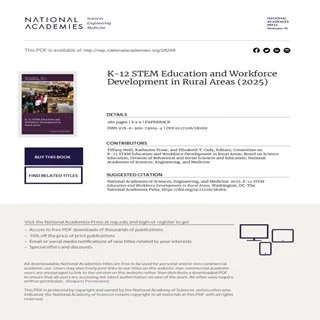The COVID-19 pandemic has presented unprecedented challenges to the nation's K-12 education system. The rush to slow the spread of the virus led to closures of schools across the country, with little time to ensure continuity of instruction or to create a framework for deciding when and how to reopen schools. States, districts, and schools are now grappling with the complex and high-stakes questions of whether to reopen school buildings and how to operate them safely if they do reopen. These decisions need to be informed by the most up-to-date evidence about the SARS-CoV-2 virus that causes COVID-19; about the impacts of school closures on students and families; and about the complexities of operating school buildings as the pandemic persists.
Reopening K-12 Schools During the COVID-19 Pandemic: Prioritizing Health, Equity, and Communities provides guidance on the reopening and operation of elementary and secondary schools for the 2020-2021 school year. The recommendations of this report are designed to help districts and schools successfully navigate the complex decisions around reopening school buildings, keeping them open, and operating them safely.








